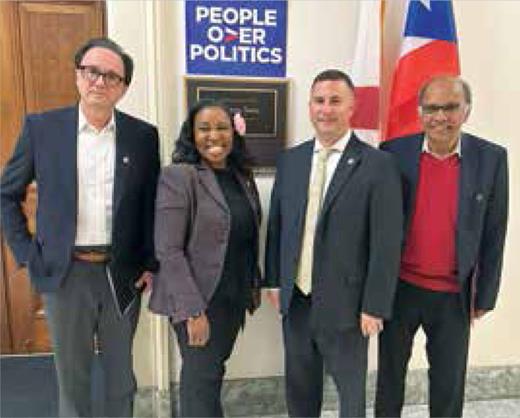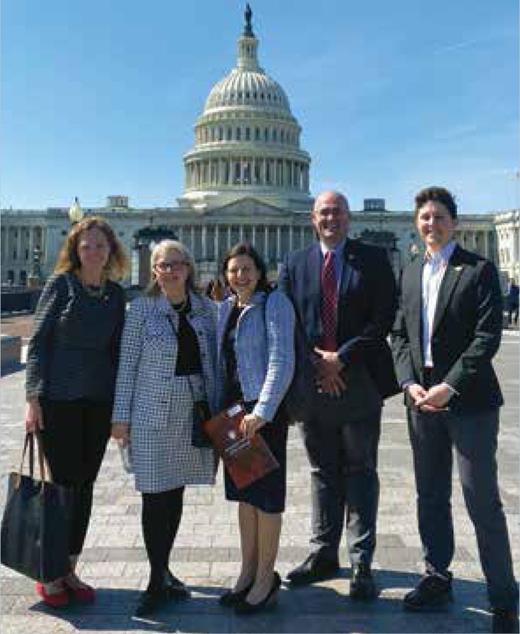Following its March business meeting in Washington, DC, the ASH Committee on Government Affairs visited 25 congressional offices representing 14 states. Committee members urged members of Congress to support funding for public health and research programs important to hematology, including the National Institutes of Health (NIH), the Centers for Disease Control and Prevention’s Sickle Cell Data Collection program, and hematology research in the Department of Defense’s Congressionally Directed Medical Research Programs.
ASH advocates also voiced their support for legislation that would provide access to comprehensive, high-quality outpatient care (including recommended clinical, mental health, ancillary, and support services) to individuals with sickle cell disease (SCD) who are insured through the Medicaid program.
Advocacy meetings are an important component of ASH’s advocacy efforts. They provide an opportunity for members of Congress, their staff, and federal agencies to gain insight into issues of concern to hematologists, including SCD and hematology research. However, the Society needs the help of all members to raise the visibility of these priorities. You can participate in the Society’s advocacy efforts by joining the ASH Grassroots Network at hematology.org/Advocacy or email ASH Senior Manager, Legislative Advocacy Tracy Roades at troades@hematology.org for additional information.
Pictured left to right: Marcos de Lima, MD (Ohio State University, Columbus, OH); Dorothea Douglas, MD (Nemours Children’s Hospital, Orlando, FL); Rep. Darren Soto (D-FL); and ASH President Mohandas Narla, DSc (New York Blood Center, New York, NY).
Pictured left to right: Marcos de Lima, MD (Ohio State University, Columbus, OH); Dorothea Douglas, MD (Nemours Children’s Hospital, Orlando, FL); Rep. Darren Soto (D-FL); and ASH President Mohandas Narla, DSc (New York Blood Center, New York, NY).
Pictured left to right: Stephanie Guarino, MD (Nemours Children’s Health, Wilmington, DE); Dianna Howard, MD (Wake Forest School of Medicine, Winston Salem, NC); Kirsten Williams, MD (Emory University/Children’s Healthcare of Atlanta; Kevin Rakszawski, MD (Penn State Milton S. Hershey Medical Center, Hershey, PA); and Ellen Fraint, MD (Nemours Children’s Health, Wilmington, DE).
Pictured left to right: Stephanie Guarino, MD (Nemours Children’s Health, Wilmington, DE); Dianna Howard, MD (Wake Forest School of Medicine, Winston Salem, NC); Kirsten Williams, MD (Emory University/Children’s Healthcare of Atlanta; Kevin Rakszawski, MD (Penn State Milton S. Hershey Medical Center, Hershey, PA); and Ellen Fraint, MD (Nemours Children’s Health, Wilmington, DE).
Updates on Medicare Physician Payment Fix
Congress passed legislation in March that included provisions to finalize six of the 12 fiscal year (FY) 2024 appropriations bills, along with several health provisions, including one that would mitigate the 3.37% cut to Medicare physician payment that took effect on January 1, 2024. Specifically, the provision would reduce the cut by 1.68% prospectively, leaving 1.69% of the cut in place. Congress did not include any proposed policies to reform Medicare physician payment and end this cycle of conversion factor decreases; therefore, ASH anticipates that physicians will face another conversion factor cut on January 1, 2025. Once this conversion factor is implemented, Medicare physician payment will have decreased by more than 6% since 2020. However, there is still hope for long-term Medicare payment reform, as six senators have formed a bipartisan working group and plan to solicit feedback from stakeholders. Its goal is to release legislative text this summer.
Take Action on Behalf of Public Health and Hematology
Each year, U.S. representatives and senators make decisions that profoundly affect hematology research and practice. ASH is the leader in representing the interests of scientists and clinicians working in hematology in Washington, DC, both on Capitol Hill and within federal agencies. ASH plays a vital role in influencing policies that affect researchers, clinicians, and patients by educating lawmakers and government staff on critical issues such as NIH funding; government activities in SCD research, training, and services; patient access to safe, effective, and affordable prescription drugs and therapies; and physician reimbursement.
But it’s not enough for organizations alone to advocate for hematology – policymakers want to hear from constituents, too. ASH needs its members to advance the priorities for hematology research and practice. To learn how you can raise awareness and encourage action, visit the ASH Advocacy Center at hematology.org/advocacy.


